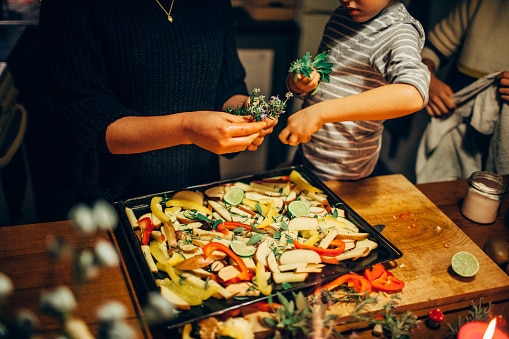Are busy weeknights preventing you from eating healthier?
What if planning and cooking meals saved you time, money and improved your eating? When you have a plan, cooking becomes an easier task. Without a plan, you may find yourself making multiple trips to the grocery store, eating out or buying more expensive prepared meals. This can feel stressful, more complicated, and something you just don’t feel you have the time to do.
To begin, you will need to set some time aside to plan your meals; however, like anything – with practice, the less time it will eventually take.
Here are some tips to get your started:
- Think about the recipes that work well for your family and your available time for the week. You can search for ”quick healthy meals and recipes” on the internet for new ideas. Your local library has great cookbooks with that theme as well.
- Make cooking meals manageable for yourself. Maybe you begin by planning to cook 2-3 meals for that week. Taking the time to prep weeknight meals will likely leave you with leftovers that can be used on another day when you don’t have as much time for cooking.
- Think about food ingredients that can be used twice in the week. If you are buying cilantro for one recipe look for another recipe that uses it as well so you can use it up and prevent unnecessary food waste.
- Doubling recipes takes very little extra time, but provides you with extra food to use again that week, freeze for a quick meal at a later date or use for lunches.
- Recruit help to plan, prepare and cook meals. There are many ways to involve your children, spouses, or other family members with food prep and cooking. (This will also give them the benefit of learning how to prepare and cook for themselves – which means less work for you 😉 )
- Invest in kitchen equipment that can help save time. For example, an electric pressure cooker takes little active time and offers great tasting home cooked meals in a hurry. There are a lot of websites dedicated to this type of cooking with well tested, family approved recipes. Kitchen equipment can be quite costly, so keep your eye on sale flyers for when stores provide them at discount and clear-out prices.
- Try foods from different cultures or experiment with plant-based options. When you plan and cook with new ingredients and flavours, this sparks interests and exposes family members to new foods. *Going plant-based can also help to save costs. For example, beans and lentils are high in protein but don’t come with the heft price tag that some meats do.
- Make extra food items like noodles or rice that can be used in another meal. For example, have Italian tomato sauce, pasta and homemade veggie “meat” balls one night and a noodle casserole another night.
- Some days you have more time to prepare a meal than on other days. When you have time, you might be able to prep ingredients for upcoming meals and on other days you may want to use some shortcuts like frozen, prepped vegetables, fruits or other items.
- Learning how to read food labels can help you make informed choices for healthier food options. For more information on what to look for on a food label click here
- One of the best things about planning ahead and cooking more often is the money you can save. Making meals from scratch can be less expensive than purchasing prepared food from outside the home
Planning and cooking meals everyday doesn’t happen overnight. If you eat out often, see about trying homemade meals instead for a few of those nights to start. Planning ahead can help reduce food waste, save money and help you to eat healthier. Give it a try for a few weeks and see what you think!

